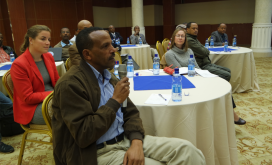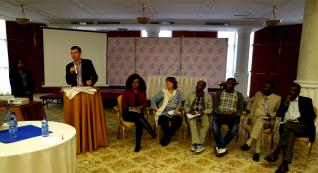A Learning Seminar on Monitoring for Sustainability was organized by IRC with the One WaSH National Program, UNICEF, COWASH Project and Aguaconsult on 9th August 2016 at Getfam Hotel, Addis Ababa.
Published on: 16/08/2016
The seminar aimed at sharing some of the latest experiences in monitoring for sustainability, and identifying next steps for the wider use of relevant tools within the Consolidated WaSH Account (CWA) and the wider One WaSH National Programme. Over 35 people from the WaSH sector and Development partners participated on the Seminar.
An opening remark was given by, Mr. Nuredin Mohammed, Water Supply and Sanitation Directorate at the Ministry of Water, Irrigation and Energy (MoWIE). Nuredin said, "In the past GTP1 years the government has been giving attention to clean water supply where by more than 160,000 water schemes have been constructed and in order for the schemes to be sustainable we need to work on the sustainability issues." He further stated that in GTP2 sustainability is given more attention than construction and it is time to look at best examples of sustainability check tools in Ethiopia, as well as in other countries, so they can be scaled up for implementation. This set the scene for the seminar well, followed up by critical introductions from Muhamed Ibrahim (National WASH Coordination Office) and Tamene Hailu (Ministry of Water, Irrigation and Electricity)
Different case studies on various initiatives of sustainability check tools were presented and critical questions on their scalability and wider uptake were discussed. The case studies presented were on; Sustainability and the ONE WaSH National Program, Development of national WaSH Monitoring and Evaluation systems and the monitoring of sustainability, Sustainability checks and plans for 8 small towns in the ONE WaSH Plus Programme, Testing the sustainability index tool in rural Ethiopia, Sustainability monitoring framework, The new national operation and maintenance manual for rural water supply, Monitoring ODF sustainability and Assessing the status, quality and sustainability of CLTS implementation.
A panel discussion was also conducted on issues such as, similarities and differences on sustainability of water and sanitation, how the sustainability checks in towns were useful, whether the studies presented on the seminar would be considered in the revision of the One WaSH National Program documents and on the role of the civil society on pushing the sustainability check tools from project based to sector wide implementation.

The seminar put the practice of Sustainability Checks on the agenda, and shared key lessons from existing applications in Ethiopia. Clearly, Sustainability Checks need to be simplified if there is to be wider uptake, but uptake will also be hugely boosted by the better data that is expected to become available through new and improved WASH M&E systems. Sustainability Checks show what can be done with such data.